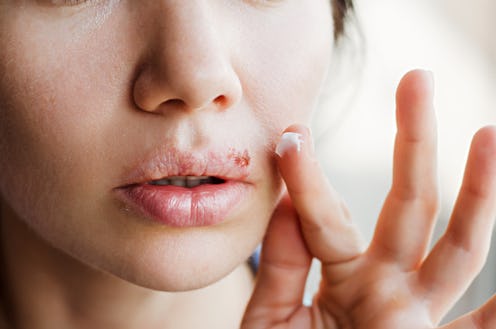
Since they have a habit of cropping up at the worst time — like right before a job interview — you've probably wanted to know how to treat a cold sore, in order to get that pesky thing off your face. They can be painful, as well as distracting. But doctors have a few things they want you to know before taking care of it yourself.
First of all, it's important to keep in mind that cold sores are massively common. "They are also known as fever blisters [...] and are caused by a virus called herpes simplex type 1," Dr. Rhonda Kalasho, a double board-certified dentist, tells Bustle. "Statistics say that 50 to 80% of Americans are carriers of the HSV-1 virus, but not all will present with a cold sore."
If ones does appear, however, you'll likely feel it coming long before you see it. "The initial symptoms include burning, tingling, and discomfort, which often precede the appearance of a shallow punched-out erosion," Dr. Rina Allawh, a board-certified dermatologist, tells Bustle. And while subtle at first, these tingles are worth paying attention to.
The moment you start having symptoms, consider applying an over-the-counter cold sore treatment called Abreva Docosanol four to five times daily with a clean cotton swab, Allawh says. This should help relieve itching and burning, especially if you combine it with an oral antiviral medication, which you can get from your dermatologist.
You can also ease symptoms with a few at-home remedies. Applying ice is a quick way to relieve swelling and discomfort, Allawh says. You can also dab on ointments like Vaseline or Aquaphor to moisturize the area, and reduce swelling. "I recommend putting the emollient in the refrigerator prior to use as the cooling sensation can further help relieve itching, burning, and pain," Allawh says. "Pain relievers such as [...] acetaminophen may further aid in discomfort associated with cold sores."
Some folks apply lemon juice or toothpaste as a cheap, easy way to clear up a cold sore, without having to resort to medications. But you may want to think twice before giving these tricks a try. "Some report these methods have helped 'dry out' the sore faster," Allawh says, but the reality is they often make the pain and swelling worse, and have no real impact on the healing process.
While it might be tempting, you'll also want to avoid touching or picking at your cold sore. "Try not to pop the blisters because they contain the herpes virus, and you can spread it to other areas or other people," Viseslav Tonkovic-Capin, MD, a board-certified dermatologist, tells Bustle. "Always wash your hands after touching the affected skin."
The good news is, even if you don't do a thing, the cold sore should clear up on its on in about a week, Tonkovic-Capin says. So it's really just a matter of alleviating your symptoms while you wait, and of course letting your doctor know if the sore seems to be getting worse.
From there, it can help to take a few precautions to lower your risk of getting cold sores in the future. "Make sure that you minimize stress [...] which can exacerbate or bring on a cold sore," Kalasho says. While it can't always be avoided — and it is why cold sores seem to appear at the worst times, like before job interviews — you can try to get plenty of sleep, and do things to avoid excess stress, such as meditating, exercising, and picking up a few relaxing hobbies.
It's also always a good idea to protect your skin with sunscreen. "Sun exposure may often trigger outbreaks and worsen a current outbreak," Allawh says. "A lip balm with an SPF of 30 or higher and broad spectrum protection can help protect your lips year round."
Cold sores can't always be avoided, and if one appears it definitely isn't the end of the world. But there are ways to alleviate your symptoms and feel a bit better as it heals. And, by relieving stress and protecting your skin, you may even be able to have fewer cold sores in the future.
Experts:
Dr. Rhonda Kalasho, double board-certified dentist
Dr. Rina Allawh, board-certified dermatologist
Viseslav Tonkovic-Capin, MD, board-certified dermatologist